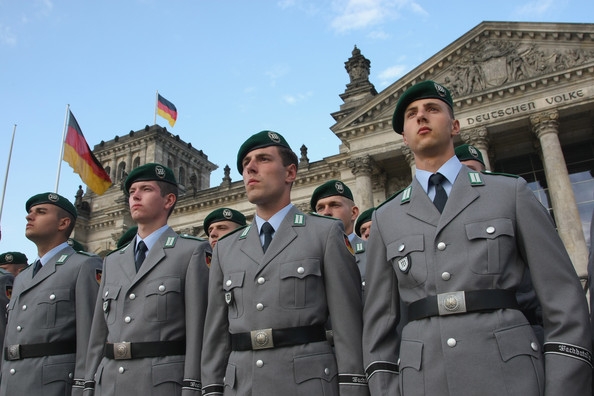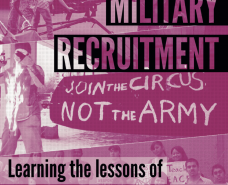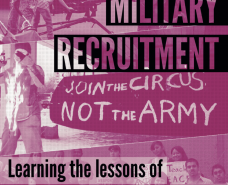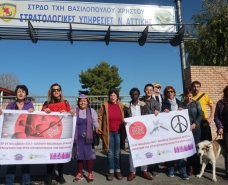'Die for your country': Turning to bravery, loyalty and honour in order to legitimise war and recruit soldiers in Germany

Jonna Schürkes
Persuading the German people that German soldiers - many of them young - should go to war is not an easy endeavour. Every militarist tries to do so and each one has a different explanation for people’s reluctance. The president of Germany, Joachim Gauck, sees it as denial by those who prefer not to acknowledge the fact that German soldiers are still getting killed and injured in combat. He laments how people are not ready to sacrifice themselves for society because of their egoism, saying '“[these people] all too easily forget that a functional democracy also requires effort, attention, bravery and sometimes even the utmost that a man can offer: his life, his own life!”' He also complains about people who come to the wrong conclusions through their knowledge of German history: '“...'Count us out' as a pure reflex is not an appropriate stance if we are to take our past seriously”'.[1]
Making Germany’s past war crimes into an obligation to engage in military intervention in other countries, to prepare (often young) people for killing others and coming back from war physically and psychologically damaged (or not at all), is an enormous feat which the German politician Joseph Fischer emphasised by declaring: “I’ve not only learnt: never again war! But I’ve also learnt: never again Auschwitz”.[2] In this way he justified the participation of the German Armed Forces in the war between NATO and Yugoslavia.
However, several surveys indicate that the German public’s reluctance for foreign missions is on the rise, despite all attempts made to enlist peoples’ support through reasoning. Yet the usual reasons given by interviewees are ambiguous: are they refusing this commitment because they think that the people in the countries where German forces intervene suffer, rather than benefit, from the soldiers’ presence; or are they rather of the opinion that this form of help is simply not financially viable in the face of the economic crisis and the increasing number of German soldiers killed in combat?
Since militarists now seem to increasingly assert the latter argument, military interventions are now clearly being justified by economic interests and geostrategies. While the former president of the Federal Republic was harshly criticised for stating this during his term of office, for which he was obliged to resign, it is obvious that for the Minister of Defence '“our interests and our place in the world are fundamentally determined by our role as an exporting nation and high-tech country in Central Europe. Consequently, we have a national interest to have access by land, sea and air.”'[3] This may help to convince people who are afraid that the price of war could be higher than its economic benefits. But the death of German soldiers can’t be justified in this way. It’s necessary to appeal to people with values such as patriotism, pride, homeland, bravery, readiness to make sacrifices, and overcoming self-centred wishful thinking.
In April 2010 the mandate for the intervention of the Federal Armed Forces was to be renewed. The loss of three German soldiers was used by Angela Merkel not only to promote the prolonging of the intervention but also to influence public opinion. She said that the fallen soldiers were courageous '“because they accomplished their duty of defending our rights and our freedom, fully aware that they were risking life and limb”', loyally serving their country. Merkel cited Helmut Schmidt, who in 2008 swore on oath that German soldiers were not being abused by the state: '“Yes…this State…asks a lot of its soldiers, a lot indeed, as has recently become painfully clear. However it will never abuse them. It puts them at the service of free and democratic values of this nation.”' Moreover, she repeated the oath sworn by every recruit: '“I swear to serve loyally the Federal Republic of Germany and to defend courageously the rights and the freedom of German people.”' She demonstrated the soldiers` courage by telling the story of one who was awarded a medal of honour for saving a group of his comrades from an ambush by shooting an Afghan soldier. Before explaining why she believed the interventions by the Federal Armed Forces were necessary, she also alluded to Obama’s words: '“The soldier's courage and sacrifice is full of glory, expressing devotion to country, to cause, to comrades in arms.”'[4]
Representing people's deaths as a service to the nation, and what they do as courageous and brave, not only expresses the aim of renewing the intervention mandate in order to participate in the war in Afghanistan, but it also helps the attempts to keep soldiers (and their sphere) in line and to convince young people to join the armed forces to participate in this war and future wars. Thus the military's current campaign (which started in 2011) to increase recruitment concentrates on concepts such as bravery, loyalty, honour and homeland: ‘We serve Germany’ affirms the motto.
The posters which, with this slogan, advertise military service, demonstrate what lies behind each individual word: ‘we’ as ‘comradeship’ - where women are looking up to strong men; ‘serve’ as in sacrificing one’s own life, and ‘Germany’ as homeland, which is represented by people painted in black, red and yellow, by the waving of German flags, and through the pictures of families and senior citizens being entertained on a military boat, with ‘Germany is rich and respected’ written above them.[5]
The lack of appeal these values have to young people is lamented in the most recent report by the youth officers (Jugendoffiziere), who are responsible for advertising war as necessary and military service as honourable. It is said that young people are little inclined to make a ‘personal contribution’ to establish ‘peace through freedom’. Of course only their concept of peace and freedom is considered valid, and the ‘personal contribution’ entails going to war. The report claims that ‘by exchanging views with young people the youth officers establish that the clearly individual perspectives of role models within families or circles of friends are somewhat taken on without critical reflection. The tenor is at times stereotypically, polemically, and even partly radically, shaped. In such cases the teachers are acting pedagogically by involving the youth officers.’[6]
A potent mixture is concocted for this concept: war as the way of carrying out economic interests, participation in these wars as a service to society, death as sacrifice for the homeland, killing as bravery.
Notes
[1] Joachim Gauck, first official Armed Firces visit, Hamburg, 12 June 2012. http://www.bundespraesident.de/SharedDocs/Reden/DE/Joachim-Gauck/Reden/2012/06/120612-Bundeswehr.html (accessed December 2012).
[2] Joschka Fischer, 'Ich habe gelernt: Nie wieder Auschwitz', Süddeutsche Zeitung, 24 January 2005. http://www.sueddeutsche.de/politik/fischer-ich-habe-gelernt-nie-wieder-auschwitz-1.915701 (accessed December 2012).
[3] Thomas de Maizière, Reorientation of the Bundeswehr speech, Berlin, 18 May 2011.
[4] Minutes from Darmstadt conference plenary 17/37, 22 April 2010.
[5] Bundeswehr, 'Wir. Dienen. Deutschland.' http://www.wirdienendeutschland.de (accessed June 2012). [6] Annual report of the youth officers, 2011. (accessed 23 May 2012).
Translated from the original German by Eleonora Romagna and Richard Meakin
Source: WRI
Countering Military Recruitment

WRI's new booklet, Countering Military Recruitment: Learning the lessons of counter-recruitment campaigns internationally, is out now. The booklet includes examples of campaigning against youth militarisation across different countries with the contribution of grassroot activists.
You can order a paperback version here.








